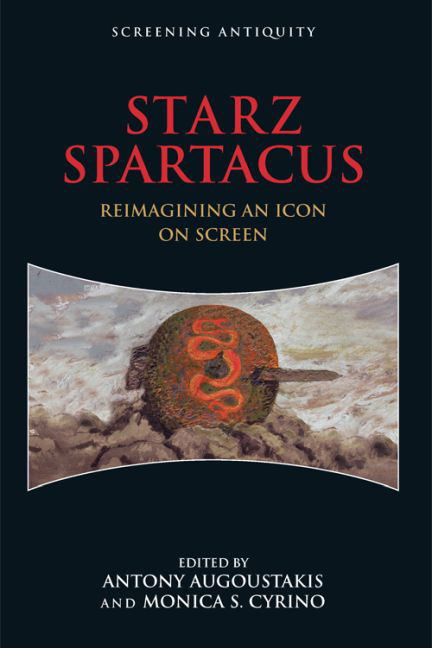Book contents
- Frontmatter
- Contents
- Series Editors' Preface
- Editors' Acknowledgments
- Contributors
- List of Illustrations
- Episode Listing
- Introduction: Reimagining a New Spartacus
- PART I HEROES AND HEROISM
- 1 Memories of Storied Heroes
- 2 From Kubrick's Political Icon to Television Sex Symbol
- 3 The Life and Death of Gannicus
- 4 A New Crassus as Roman Villain
- PART II SOCIAL SPACES
- PART III GENDER AND SEXUALITY
- PART IV SPECTACLE AND VIOLENCE
- Filmography
- Bibliography
- Index
2 - From Kubrick's Political Icon to Television Sex Symbol
from PART I - HEROES AND HEROISM
Published online by Cambridge University Press: 27 April 2017
- Frontmatter
- Contents
- Series Editors' Preface
- Editors' Acknowledgments
- Contributors
- List of Illustrations
- Episode Listing
- Introduction: Reimagining a New Spartacus
- PART I HEROES AND HEROISM
- 1 Memories of Storied Heroes
- 2 From Kubrick's Political Icon to Television Sex Symbol
- 3 The Life and Death of Gannicus
- 4 A New Crassus as Roman Villain
- PART II SOCIAL SPACES
- PART III GENDER AND SEXUALITY
- PART IV SPECTACLE AND VIOLENCE
- Filmography
- Bibliography
- Index
Summary
When Stanley Kubrick presented his version of Spartacus in 1960, the film was more than just a cinematic reading of an historical event. Although this was not the first film adaptation of the story of the gladiator who led the so-called Third Slave War (73–71 bc), Kubrick's version undoubtedly established a permanent image of the Thracian in the contemporary popular imagination. A big part of this representation has to do with the political and ideological nature that Kubrick's film imprinted on the character of Spartacus. In the early twenty-first century, this image of the gladiator-slave emerged again, but the political symbolism changed toward a more sexualized meaning through the representation offered by the STARZ series. It is this metamorphosis that I aim to analyze in this chapter.
THE 1960 SPARTACUS
Much has been written about the context that led to the production of Kubrick's film. This context remains crucial to our understanding of the importance of the film and what it represented for the second half of the twentieth century. As Martin Winkler notes, “To do justice to any literary or filmic text, scholars must be closely familiar with it: with its content, contexts, origin, reception, and existing scholarship.” Thus it is worth noting that Kubrick's film is based on the novel Spartacus by American writer Howard Fast, published in 1951 during the Cold War, while it is also important to recall that Fast was a leftist activist and a member of the American Communist Party from 1943 to 1957. Fast's version of the Thracian slave, therefore, echoes the image developed in the nineteenth century of a hero who represented the values of Marxist ideology, as Spartacus was regarded as the leader of a slave rebellion and reflected, as a result, an archetype of social resistance and class struggle. Marx's reading of Appian's Roman history, together with the events of his own time, namely the revolution led by Garibaldi in Italy and the American Civil War, had aroused in him such an interest in Spartacus’ character that he called him “a genuine representative of the ancient proletariat.” This identification of the historical character was clearly rhetorical, since Marx wanted to use Spartacus as a representation of his own conception of history and ideology.
- Type
- Chapter
- Information
- STARZ SpartacusReimagining an Icon on Screen, pp. 34 - 51Publisher: Edinburgh University PressPrint publication year: 2017



